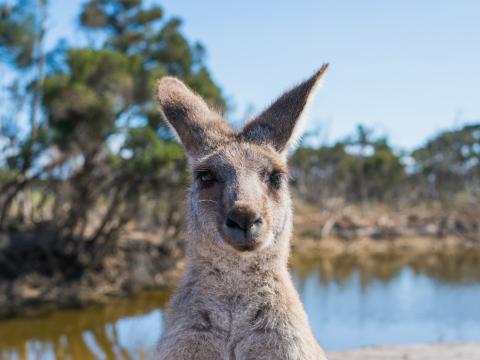Kangaroo hunting is cruel and the trade of the product derived from kangaroo species also raises serious conservation and food safety concerns. It is time to ban the imports of kangaroo meat and products, such as leather, to the EU to respect the ethical concerns of EU citizens.
Kangaroos are shot at night, in remote areas far away from any scrutiny or enforcement controls, leading to non-lethal shots that can cause horrific injuries and a slow death if the animals escape. Up to 40% of shots are non-fatal, causing painful death despite the Code of Practice requiring fatal headshots. Similarly, about 30% of filled kangaroos are female. As young kangaroos are dependent on their mothers for two years, it leaves many to endure a cruel and violent death. It is estimated that 400,000 joeys are killed each year. The prescriptive method to put a joey to death is to swing its head against a vehicle to crush their skull and destroy their brain. Those who do not suffer this violent death are left in the field to suffer exposure to dehydration, starvation or predation.
The commercial killing of kangaroos relies on a quota system based on the estimated population of the species. Inaccurate estimates can endanger the species. An inquiry into the health and wellbeing of kangaroos that was submitted to the Government of New South Wales - one of the states hunting most kangaroos in Australia - highlighted the lack of transparency and questions the science, largely based on extrapolations, around population estimates established for kangaroo harvesting in this State. The inquiry recommended further assessment of the quota setting system. Kangaroos play an important role for the health of ecosystems and other species, making this situation particularly alarming.
Kangaroo hunters and industry argue that killing kangaroos is necessary for effective population management to prevent overpopulation and improve welfare outcomes. This statement goes against basic principles of biology recognising that native wildlife populations depend on the “carrying capacity” of their habitat. Kangaroos have not been shown to overpopulate and they are uniquely adapted to the Australian landscape. They are mostly regulated by rainfall levels and some can regulate reproduction in response to environmental conditions. Currently, commercial interests drive the kangaroo industry, not environmental or welfare concerns.
Furthermore, the conditions in which kangaroo hunting is carried out lead to significant hygiene issues, and to risks for food safety. There are inherent risks of bacterial contamination of the meat, due to the butchering in the field and the long, exposed, unrefrigerated transport of the carcasses. Lactic acid was found to be routinely used to decontaminate the meat, although this isn’t an allowed practice for fresh game meat in the EU. There is also a risk of lead poisoning, particularly exposing children and pregnant women, due to the use of lead bullets contaminating the meat.
Despite being an iconic species in Australia, kangaroos are victims of a cruel hunt fueling the EU industry. The EU is indeed the first importer of kangaroo products representing more than 30 million EUR between 2012 and 2016. Their meat is sold in European supermarkets or used in pet food while kangaroo skin and hides or leather are also imported to produce luxury sports equipment such as shoes. The killing of kangaroos can also have detrimental effects on social interactions and the structure and life of the mob.
As the European Union is the main importer of kangaroo meat, we believe it is crucial that the EU finally adopts a ban on the imports of kangaroo-derived products.
KANGAROOS HUNTED FOR THEIR SKIN OR MEAT IN LAST 30 YEARS
WORTH OF IMPORTS TO THE EU BETWEEN 2012 - 2016
JOEYS KILLED BETWEEN 2000 - 2009
WHAT DOES THE PUBLIC THINK?
For EU citizens, kangaroos are first and foremost the icon of Australian wildlife. Nearly 50,000 people supported a petition asking for the end of EU imports of kangaroo products. Our member World Animal Protection (WAP) Netherlands launched another petition asking Dutch companies to stop selling kangaroo products that so far collected 40,000 signatures.
Acknowledging these concerns, several brands and retailers such as Bol.com, Wehkamp, Viking (skate manufacturer), Delhaize, Carrefour, Jumbo, Sligro, Aldi or Spar have announced plans to stop the production or sale of kangaroo products.
POLICY - CURRENT STATE OF PLAY
As the main importer of kangaroo products the EU must recognize its responsibility and act to put an end to this cruel hunt raising serious ethical concerns against the respect of sentience.
In the past, the EU has already addressed such animal welfare concerns by regulating the trade of seal products. Similarly to kangaroos, seals suffered a high percentage of non-fatal shots and endured painful deaths. Regulation (EC) No 1007/2009 on trade in seal products therefore prohibits the placing on the EU market of seal products. Similar provisions must be adopted in respect of EU standards on animal welfare to protect kangaroos.
In the Netherlands, a motion was voted at the Dutch parliament calling for the Dutch government to push for an EU ban on kangaroo products imports.











